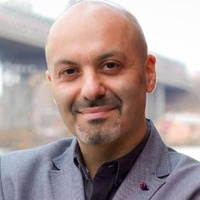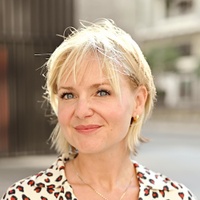On resisting the expectations of others
Prelude
Greta Morgan is a musician, songwriter, and storyteller who began her career at age 16 and has since performed worldwide. She was a touring member of Vampire Weekend, accompanied Jenny Lewis, and has released eight records fronting her own projects: Springtime Carnivore, Gold Motel, and The Hush Sound. She has stopped performing for the time being to focus on Long Covid recovery, which affected both her voice and body. She now lives in the Hudson Valley, where she leads a slow life of creek swimming, stargazing, meditating, writing, composing, and teaching. She leads long-form online songwriting and creativity workshops that focus on helping writers access their truest voices. Find her on Instagram @gretamorgan and learn more at gretamorganmusic.com.
Conversation
On resisting the expectations of others
Musician and author Greta Morgan discusses finding balance after loss, leaning into your strangeness and getting grounded with meditation
As told to Caitlin Wolper Phillips, 1604 words.
Tags: Music, Writing, Mental health, Adversity, Beginnings, Process, Independence, Health.
You have said that your singing voice is how you’ve understood your inner world when it became inaccessible—and you spent a lot of time fighting to kind of get it back. How do you connect with your inner world now?
I do still connect with my inner world through playing music, and I do still connect with it through singing—although my voice has been very changed—but my meditation practice is such a huge part of my life. In addition to vocal dystonia, I’ve also been navigating long COVID over the last few years, but acutely over the last 18 months. And one of the symptoms of that is what mimics Chronic Fatigue Syndrome, so instead of just resting all day, I treat it as meditation time. I’m meditating between two and six hours a day. There’s a meme I saw recently of Lisa Simpson, and it’s like “what it looks like I’m doing,” and she’s laying in bed, and then it’s like, “what I’m actually doing,” and it shows Lisa surrounded in this golden, glowing orb, having an enlightening experience.
And when I saw that, I was like, “Yeah, that’s exactly how it feels.” So I connect with myself and with my inner world through meditation and through connecting with the part of me that imagines, and the part of me that plays, and the part of me that generates ideas, and the part of me that loves.
You spoke about the early pressures on you to sound different than you did naturally. What was the first time you felt like you weren’t using your own voice?
When we were making [the second Hush Sound] record, the producers kept pushing me to sing like Fiona Apple. I was a 17-year-old Catholic school virgin with a very whispery, quiet voice. I was a total late-bloomer, and my voice was as innocent as I was. They were telling me to sing like someone who had had a completely different life experience, who had a completely different vocal tenor.
One of the phrases the producer said was, “You have to sing with your balls. You’ve never felt it before, but it’s time to start singing with your balls.” At that time, my sense of self and my musicality were so completely merged that when they told me I wasn’t singing right, and I needed to sing like someone else, I just immediately thought, “Oh, well, I’m no good at anything,” or “I’m not worthy of anything.”
[Now] I teach writing workshops, and one of the things I’m always saying is keep the weirdness and beauty and originality of your voice. Do not impersonate anyone.
How do you make sure you don’t sideline yourself, and preserve your identity as an artist?
We live in a world where all art is touching all other arts, the same way that in nature, pollen in the air is touching every plant in the area. We will naturally start influencing each other’s art, and I think we will naturally start imitating in really subtle ways just by existing. It’s like we’re all breathing the same artistic air. But I do think as artists, we start to cultivate our own unique vision, and we need to move towards strangeness and towards what feels like us.
Let’s say every single choice you make, you can visualize yourself on two paths: Should the chorus be big and bright, or should the chorus be sad and drop down?
In my mind, I can close my eyes and imagine going one way and imagine going the other way. Whichever way lights up and whichever way feels expansive, I’m like, “Oh, that’s the way that’s the most me. That’s the way where I’m not imitating.”
What role can creativity play in healing?
For me, it’s everything. When I started playing music, it was like making my own medicine, like the way an herbalist would make a tincture. I would write a song that would give me the specific feeling I was seeking. But I do think big-picture creativity is a way to alchemize our experience into something beautiful, like the way that an oyster turns the sand into a pearl.
But I also think it’s a way to come back to oneself. When you’re making your art and you’re not thinking about who’s going to see it or what are they going to think about it, it’s a way of saying, “Oh, there I am.” Like, “Oh, that’s my spirit on the canvas.” “Oh, that’s my spirit in the song.” And in a world that is constantly trying to confuse us about who we are so we will shrink into a certain set of other people’s expectations, it’s really important to make art as a way of remembering who we are.
How did your experience in national parks affect your sense of identity?
I really love imagining that nature is a mirror for unexplored aspects in our own psyche.
When I was in the desert, my voice had shorted out, but I didn’t quite know the diagnosis yet. I just knew something was really wrong. And also, these were the relatively early days of the pandemic when … it just felt like the world we knew was gone, and everything felt strange. I felt so desolate and raw and ravaged.
Being in the desert, I would notice the Navajo sandstone, I would notice these gorgeous lush hanging gardens with ferns and orchids, and all these beautiful plants that were growing out of what looked like solid rock. And it was because they were able to root down and suck moisture from very deep in the rock. [In] one of the mirroring moments, I thought, “I need to do that. I am going to root down to a place in myself deeper than I have known, and find a kind of nourishment I haven’t found before.”
I had been moving so fast and conversing so much and flying all over the world and playing millions and millions of shows, and all of a sudden, being in silence—it was like drinking from a deep well. I had learned so many lessons from togetherness and collaboration and it was time to learn some lessons from just being in silence.
In one of your national park trips, you befriended a woman who said, “You lost your voice. I’m so happy for you.”
It’s funny. I remember her saying that line exactly.
She is an incredible wilderness guide and IFS therapist, a brilliant, brilliant person, and she has noticed in the lives of all the people she works with that often there is a major eruption in the timeline of someone’s life, and that wounding becomes the access point for whatever the greatest healing is.
In a way, I lost my literal voice, and my literal voice has been challenged and changed. But I do feel like I found my voice: my book, the way I communicate in relationships, the way I move through the world.
With my literal voice, I was shrinking constantly. I was not articulating my truth. I was not speaking up to bullies. I was not standing within my integrity as far as expressing my truth as much as I could. Now, my literal voice has changed, but I feel so much more confident in those areas of life.
I think in some ways she knew: “You lost your voice. This might be part of the mythic, poetic journey of your life.”
Day to day, where are you finding joy?
I live in the Catskills in New York, and this is one of the most enchanting places I’ve ever been. This winter, I found a lot of joy by crunching on ice and snow after every snowstorm, because every single snowstorm created a different soundscape. If the wind was faster one night, or if it was colder one night, the ice would sound and look and feel totally different.
I have a lot of joy from just engaging with my immediate environment, a lot of joy reading by the creek. I have a lot of joy being with my friends here. I do have a lot of joy writing and still a lot of joy playing music. It’s interesting—there was just a Chicago NPR story that came out about long COVID, and I hadn’t talked about my health journeys beyond my voice publicly, and I got tons of messages from people saying a version of like, “Oh, this is such a tragedy. I’m so sorry. You’re so sick.” And I was like, “Yeah, it’s been hard.”
But also even on a bad day, I have so much joy. Even on a challenging health day, I’m living in one of the most beautiful places I could ever imagine, and I’m dreaming, and I have a great support system, and I’m able to have a lot of happiness within whatever context I’m in.
Greta Morgan recommends:
Hug people for mental health
Practice embodied imagination
Candlelight before bed, sunlight in the eyes upon rising
Think like Mary Oliver: “May I be the tiniest nail in the house of the universe, tiny but useful.”
More analog time (phone off, holding books, making crafts, cooking, being in the really real world)
- Name
- Greta Morgan
- Vocation
- musician and storyteller
Some Things
Pagination



